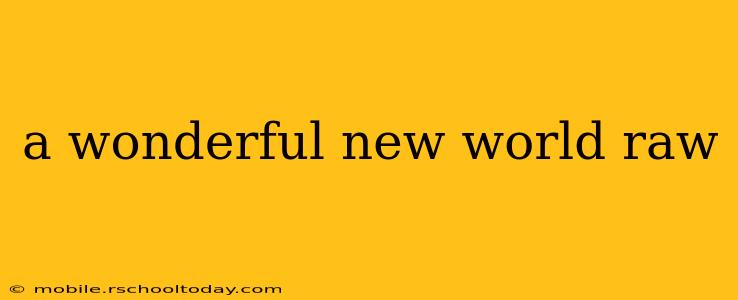A Wonderful New World: Exploring Aldous Huxley's Dystopian Masterpiece
Aldous Huxley's Brave New World, published in 1932, remains chillingly relevant today. More than just a dystopian novel, it's a profound exploration of societal control, technological advancement, and the human condition. This exploration delves into the complexities of Huxley's vision, examining its enduring impact and prompting reflection on our own rapidly changing world.
What is Brave New World about?
At its core, Brave New World depicts a seemingly utopian society, World State, that has achieved stability through technological advancements in reproductive technology, psychological conditioning, and the pervasive use of the drug, Soma. This stability, however, comes at a steep price: the suppression of individual freedom, emotion, and genuine human connection. The novel follows Bernard Marx, an Alpha-Plus individual who questions the World State's established order, and his journey alongside Lenina Crowne and John, the "Savage," who represents a stark contrast to the World State's manufactured happiness.
What makes Brave New World a dystopia?
Unlike some dystopias that portray oppressive regimes through overt force, Brave New World's dystopia is subtly insidious. The World State maintains control through subtle manipulation:
- Genetic engineering and conditioning: Individuals are pre-determined into social castes, each with a specific role and level of intellectual capacity, effectively eliminating social mobility and individual aspirations.
- Consumerism and instant gratification: The World State promotes constant consumption and pleasure, suppressing any desire for deeper meaning or purpose through readily available entertainment and the drug Soma.
- Suppression of emotions and critical thought: Negative emotions and independent thought are actively discouraged, with individuals conditioned to accept their predetermined roles and pursue instant gratification.
This subtle manipulation makes the dystopia all the more unsettling, as it highlights the potential for societal control through seemingly benign means.
What are the main themes of Brave New World?
The novel explores several interconnected themes, including:
- Technological advancement and its consequences: Huxley explores the potential dangers of unchecked technological progress, highlighting how advancements can be used to control and manipulate individuals.
- The nature of happiness and freedom: The novel questions whether manufactured happiness is truly desirable, suggesting that genuine happiness requires freedom, individuality, and the capacity for suffering.
- The importance of human connection: The World State's suppression of genuine human connection leads to a sense of emptiness and isolation, highlighting the importance of love, family, and meaningful relationships.
- Individuality vs. conformity: The conflict between John's individual spirit and the World State's demand for conformity emphasizes the importance of individuality and the dangers of blind obedience.
How does Brave New World relate to modern society?
Despite being written nearly a century ago, Brave New World remains disturbingly relevant. We see echoes of its themes in:
- The rise of consumerism and social media: The constant bombardment of advertising and the pursuit of instant gratification through social media parallels the World State's emphasis on consumerism.
- Genetic engineering and reproductive technologies: Advances in reproductive technologies raise ethical questions about genetic manipulation and the potential for social engineering.
- The use of technology for surveillance and control: The increasing use of surveillance technologies raises concerns about privacy and the potential for governmental control.
Is Brave New World a warning or a prediction?
Huxley's work can be interpreted as both a warning and a prediction. It serves as a warning against the dangers of unchecked technological advancement and societal control. It also acts as a chilling prediction of societal trends toward consumerism, conformity, and the potential erosion of individual freedom.
What is the significance of the title, Brave New World?
The title, taken from Shakespeare's The Tempest, is ironic. While the World State presents itself as "brave" and "new," it is ultimately a world devoid of genuine freedom, individuality, and human connection. The irony highlights the deceptive nature of the World State's seemingly utopian facade.
Brave New World remains a powerful and thought-provoking novel, its relevance enduring despite the passage of time. It compels us to consider the potential consequences of our choices and the importance of safeguarding individual freedom and human connection in a rapidly evolving world.
